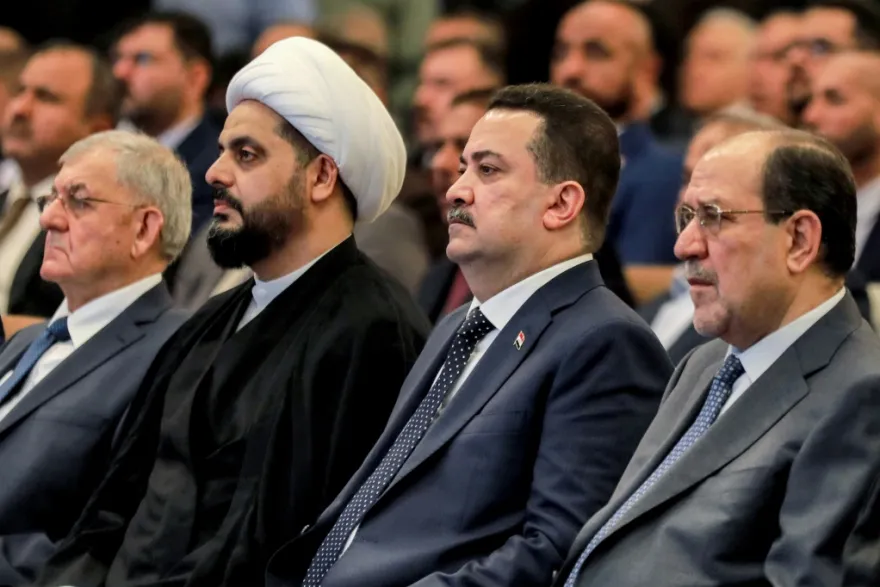As the wheel of time turned, it ground the dreams of Iraqis into dust, fracturing what remained of weary souls who had languished for years in a haze of fragmentation, longing, and disorientation. They had no shore to anchor them, no haven to rest upon. Their spirits became mere outlines, abandoned beneath a sky that did not shade them, upon earth that did not shelter them. Their eyes never closed; their eyelids never fluttered. Hearts took flight in terror at sudden raids, throats constricted with fear; minds spun in dizzying whirlpools of rumors, suspicion, and dread, unable to direct the affairs of governance.
When the marathon of political battles finally wore down its participants, the valiant rider Muqtada al‑Sadr dismounted from the steed of his dreams. Having exhausted the last of his arrows, he retreated once more to his stronghold in al‑Hannana, licking the wounds of a humiliating, bitter defeat. He left the arena to his rivals from the Coordination Framework, who lay in wait for their stumbles, their mistakes, and their weaknesses. Perhaps, he thought, he might strike advantage after the grinding crises tore through the wounded country and its battered people, reducing his adversaries to an easy meal — spat out by the distant, scorned by the near.
Muqtada watched like a fox, tail swaying, one eye closed, the other intently observing, waiting for the moment his rival would take the bait so he could strike with his claws. As always, he confined himself to tweeting from his golden cage in al‑Hannana, under the cloak of his minister, Saleh Muhammad al‑Iraqi, lamenting his fate, howling over his victimhood, promising thunder and lightning, foaming, pounding his chest, wailing over the “cake” the Coordination Framework had eaten — leaving nothing but crumbs. He called on his followers, forbidding participation in what he termed this “Abbasid” or “Gog-and-Magog” government, where the will of the people had been suppressed and dissent silenced.
Muqtada forgets that in the days of his Mahdi Army, bodies were cut and burned to strip the people of their basic rights — the very rights he now laments. He ignores the deeds of his own hands and feet against the Iraqi people, while continuing to bleat and wail, issuing his tirades, raising his voice, and invoking doom upon the founders of this government and those who joined it — yet no redemption remains.
As for the Sudani government, it stumbled from the outset. Prime Minister Muhammad Shia al‑Sudani drooled over the promises of “development” — a euphemism for the purges and reforms he had pledged — all empty rhetoric. In his first press conference, when asked by a journalist about Maliki’s statements regarding the dismissal of Sadrist governors, Sudani did not deny them, instead offering thin justifications rooted in the rigid theater of politics, explanations too fragile to hold even a morsel between the jaws.
What drew Iraqis’ attention was not Sudani’s silence on Maliki’s interference in governmental matters — he never claimed Maliki had no role — but the truth revealed itself: behind the pious façade of government lay the poisoned fang of corrupted militias. This was the first clear sign of the government’s drift toward servility to Iran and its militias, once the pretense of austerity was exposed as merely a vehicle for corruption.
Soon, cracks widened further. Sudani and the Coordination Framework slipped further along the slippery slope of self-imposed deadlines to achieve his promised results: radical reforms in infrastructure. The first symbolic blow was the transfer of the director of Al-Kadhimiya Hospital and his staff as punishment for alleged negligence after Sudani’s visit. Iraqis recoiled, seeing it as “strike the small to scare the big,” a feeble pretext to deflect blame and throw dust in the eyes of the public.
To demonstrate Sudani’s seriousness — and that of the Coordination Framework — in combating corruption and administrative decay, only a week after assuming control they struck two birds with one stone: a mass purge dismissing 169 senior officials, including governors of Dhi Qar and Najaf (Sadrists), the head of intelligence Ra’id Jawhi, head of national security Hamid al-Shatri, Abu Ragheef, and, in other accounts, over 200 officials. Iraqis described this “development” as a sectarian cleansing — sweeping the Shiite house with Iran’s broom.
When the stench of sectarian purge spread and suspicions of Iranian influence arose, Sudani and the Coordination Framework hastened to deny the accusations, claiming the action was legal — these officials were appointed without parliamentary approval by a caretaker government — and not sectarian or revengeful toward yesterday’s partners and today’s enemies from the Sadrist camp. But these excuses fooled no one; the stench of corruption was obvious.
Prompted by Amiri and Maliki, Sudani reinstated some dismissed officials — governors of Dhi Qar and Najaf — in a face-saving gesture before the Iraqi public. “If you have no shame, do as you will,” seemed to be the unspoken motto. This confirmed the government’s decisions were as fickle as the wind, openly revealing the true power behind its fragile administration — a puppet government, marionettes and brides on strings pulled by religious authorities, guided by Iranian hands on Iraq’s stage, awash in corruption.
This maneuver was also one of Tehran’s strikes to remove Al-Kadhimi’s legacy, paving the way for Qais al-Khazali and his loyal brigades to seize control of intelligence — a move that angered Maliki and Ameri, who had been worn down by time and experience. The Iranian hand pulled the rug from under their feet, raising its influence that they had long licked, their blue fangs dripping with Iraqi blood, as will be detailed later.
The pressing question remains: what alternatives has Sudani’s government offered for state administration, and on what solid foundations will Iraq rebuild its infrastructure? The answer is a shock — to be revealed in the next episode. Welcome to Iraq of mishaps, where opportunities rise from the graves to the seats of power and the highest platforms.
